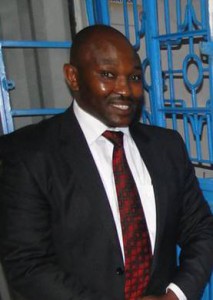As part of our celebrations of International Youth Day this year – which takes place today, August 12th – DSW’s Country Director for Kenya, George Kamau, talks about the importance of sexual and reproductive health for young men and women, and what DSW is doing to support them across Kenya.
 What is the age when sexuality is getting a big topic for youths? And who has the greatest role regarding sex education?
What is the age when sexuality is getting a big topic for youths? And who has the greatest role regarding sex education?
In Kenya (and generally in Africa), sex and sexuality is still not discussed very openly – especially across different age groups. Sex becomes a ‘hot’ topic amongst young people when they reach puberty (around 10 years) but reaches fever pitch levels at around 16 years. This is when they are really curious about their bodies and sexuality in general.
Most young people get sex education from their peers, though with the advent of smart phones the internet is fast gaining popularity (whether their own phones or borrowed). In many areas – particularly informal settlements, parents assume they will be taught in schools. Schools however only tackle the “biological bit” as religious groups are still opposed to sexuality education in schools on the premise that it will lead to promiscuity! As such the young people rely on their peers, the internet, movies (primarily sourced from the internet) and ‘well wishers’ such as DSW
How much do youths know about HIV?
Kenya declared HIV/AIDS a national disaster in 1999. Prior to that, the scourge would only be discussed in hushed tones. In fact, many myths abounded at the time with it being referred to in some cases as witchcraft or a curse. However since 1999, the Government launched an offensive against the scourge by among others running media campaigns, setting up public institutions (National AIDS Control Council – NACC and National AIDS & STI Control  Programme – NASCOP) to coordinate the fight etc. Donors such as USAID, JICA, CDC and others also joined the effort by availing funds for HIV/AIDS related programmes.
Programme – NASCOP) to coordinate the fight etc. Donors such as USAID, JICA, CDC and others also joined the effort by availing funds for HIV/AIDS related programmes.
NGOs such as DSW also began implementing HIV/AIDS programmes, including mainstreaming it within their other projects and formation of an umbrella body (Kenya AIDS NGOs Consortium – KANCO). This has seen HIV prevalence drop from 7.2% to 5.6% by 2012.Due to these concerted efforts, knowledge on HIV/AIDS is quite widespread among young people. Modes of spread are among the factors well known to young people, though this is usually hampered by shortages of condoms or in other instances test kits for ascertaining ones status. However as evidenced by the Kenya AIDS Indicator Survey of 2012, knowledge on and access to facilities for preventing mother to child transmission and ARVs still remain as gaps.
In which situations do youths look for professional advice from your side? How are you helping them the most?
Youths usually seek DSW for help on general SRH knowledge, life skills, HIV/AIDS knowledge, VCT (voluntary counseling & testing), condom provision and referrals to health facilities. In order to meet this demand, DSW trains peer educators who work from various youth clubs via the Youth-to-Youth model. DSW also has youth trucks which are used in provision of outreach services as well as running youth empowerment centres which are stocked with information materials (DVDs, leaflets, posters, books etc)
How would you describe or rate the present performance of the schools?
Schools offer young people sex education within the biological context (reproduction). However not much emphasis is given to the life skills aspect as well as sexuality as it is not part of the school curriculum. A lot however gets done through various clubs and societies, though this is largely in High schools and colleges. Primary school pupils remain largely underserved – largely due to the fact that they are minors.
 What should parents be better aware of?
What should parents be better aware of?
Parents should be aware that the most dangerous thing that can happen in a young person’s life is to have an ‘information vacuum’. Since nature abhors a vacuum, the young people will seek to fill this information gap by whatever means necessary. When this happens, they easily get the wrong kind of information from all sorts of sources. It is therefore important for parents to take the lead in creating SRH awareness among young people.
How do you see the role of religion regarding sexual education?
Religious institutions remain vital information gate keepers in Kenya. Society takes to heart what religious leaders tell them. It is therefore imperative that they play an active role in awareness creation on issues of sexuality, particularly pertaining to young people, since what they say (or don’t say) affects societal views and practices on sexuality.
What are your wishes for the future?
Young people should be given a fair platform to make informed choices in life. This can only happen when we provide adequate information and commodities as need arises, and equip them with lifeskills

